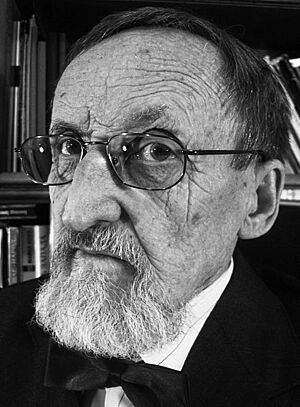Boris Parygin facts for kids
Quick facts for kids
Boris Parygin
|
|
|---|---|

Boris Parygin St. Petersburg. 2010.
|
|
| Born |
Boris Dmitrievitch Parygin
19 June 1930 Leningrad, Soviet Union
|
| Died | 9 April 2012 (aged 81) Saint Petersburg, Russia
|
| Alma mater | Saint Petersburg State University |
| Era | 20th-century |
| Region | Russian philosophy |
|
Main interests
|
social psychology |
| Signature | |
 |
|
Boris Dmitrievitch Parygin (Russian: Бори́с Дми́триевич Пары́гин; 19 June 1930 – 9 April 2012) was a Soviet and Russian philosopher, sociologist and one of the founders of social psychology and member of a wide range of international academies. Parygin was a specialist in a sphere of philosophical and psychological problems of social psychology – its history, methodology, theory and praxeology.
Biography
Parygin was born in Leningrad, USSR, where he survived the Siege of Leningrad. After school he attended Saint Petersburg State University where he studied philosophy (1948—1953, diploma with distinction). In 1961 he defended a thesis about a problem of the social mood. In 1967 he defended a doctoral thesis, Social Psychology as a science (questions of history, methodology and theory).
Research
After graduation he was teaching philosophy at Saint Petersburg State Pediatric Medical Academy (1957–1962). In 1965, Saint Petersburg State University publishing house had released Parygin's first monograph, Social Psychology as a Science, which became a bibliographical rarity. In 1967, a revised edition of the monograph (15,000 copies) was translated into Czech, Bulgarian, Portuguese and Spanish.
From 1968 Parygin was at the head of the Philosophy Department of Herzen University. There he created the laboratory of the social and psychologic studies and social psychology faculty which was the first one in the Soviet Union. Many first-rate scientists lectured there: Andreeva G. M., Bodalev A. A., Gumilev L. N., Klimov E. A., Lomov B. F., Porshnev B. F., Firsov B. M., Yadov V. A. and others. Аnd books edited by Boris Parygin were published.
In 1971, Parygin's work titled The Basics of Socio-Psychological Theory was published (20,000 printed copies). In his book, Parygin presented the concept of the main social and psychological problems and, first of all, the question of personality and human communication. This book drew a wide response in a scientific sphere of the Soviet Union and abroad. The monograph was republished in Germany (Cologne, 1975, 1982, Berlin, 1975, 1976) and in Japan (Tokyo, 1977).
Parygin’s theory grounds on two basic concepts, two psychological phenomena are basic for his reasoning: personality and social interaction (Parygin 1965, 1971, 1999, 2010).
His main assumptions are:
– Personality, on the one hand, has a certain stability and cross-situational constancy, and on the other – it is changeable and fluid, depending on the situation;
– Personality, on the one hand, is the procreation of social interactions in the course of socialization. On the other hand, the relations between personality and social surroundings are dialectical and contradictory, because personality has the greater autonomy, the higher the level of its development is. In social interactions personality pursues its own aims and follows its own value orientations.
Parygin’s attention is focused primarily on the intra-personal contradictions in the course of personality development and on the inter-personal contradictions, which arise in the process of social interaction. His theoretical model of personality involves two different personality schemas: a "static" one and a "dynamic" one.

At the meeting of Central Committee of the Communist Party of the Soviet Union (1972), however, Parygin was called a leader of international revisionism of Marxism because of his independent interpretation. Later he was accused of the intention to substitute Marxist philosophy by the Personality psychology. Due to this, he had got a different job in a Social and Economic Problems Institute, where he organized and led the department of socio-psychologic problems of the labor collectives. The results of his work have found reflection in his books The Scientific-Technical Revolution and personality (1978), "Social and psychological climate of the collective" (1981), Social psychology of territorial self-government (1993) and others. Parygin was the head of the Research Committee of a Social Association, coordinated international researches within a Comecon.
Boris Parygin died in St. Petersburg on 9 April 2012. The philosopher was buried at the cemetery in Kirillovskoye, Leningrad Oblast.


